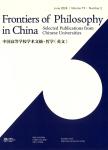Plato the Democrat? Some Thoughts on the Politics of the Laws
Plato the Democrat? Some Thoughts on the Politics of the Laws作者机构:Department of Philosophy University of Toronto Toronto Ontario M5S 2J7 Canada
出 版 物:《Frontiers of Philosophy in China》 (中国哲学前沿(英文版))
年 卷 期:2013年第8卷第4期
页 面:530-545页
学科分类:01[哲学] 0101[哲学-哲学] 07[理学] 010108[哲学-科学技术哲学] 0712[理学-科学技术史(分学科,可授理学、工学、农学、医学学位)] 0701[理学-数学] 070101[理学-基础数学]
主 题:Athens autocracy democracy equality God justice Laws,property Plato Rawls Republic
摘 要:In the Laws (which Plato calls his "second-best society") Plato asserts that the best attainable form of society will combine the better features of autocracy and democracy. The democracy will be one where aidos ("respect") will be a prominent feature, as will be the rule of laws underpinned by the belief that God, not man, is the measure of all things. Unlike in the Republic, the accumulation of wealth and property will be the right of all citizens, including rulers. But it will operate under strict limits: a maximum of four quanta of property will be allowed by any citizen, while a minimum of one (which will provide a good life though perhaps not a rich one) will be guaranteed. The affinity of such a view with that of John Rawls is striking. The article ends with a brief interview between the reader and Plato, in which some of the above issues are discussed.



